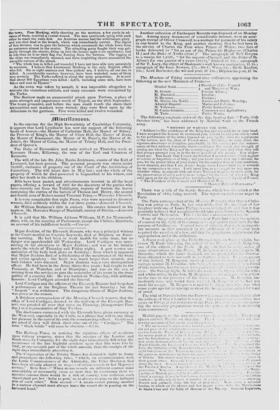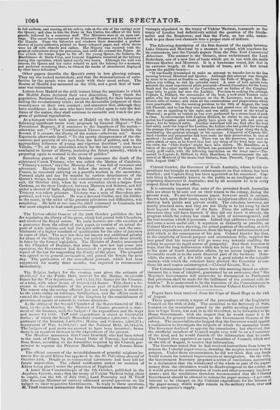Madrid papers to . ."e , :1 1st
Queen entered 31,u 1rs e1 th is d.s.
lowing iitA:0',111', 5", " 'rite tr.11 Slid net pre, tho ces-doll from tlic \
the merry pools of the and the benedictions of th.• thin every demonstratior
Royal Guards. the Lus , t
Line, the hat talicnt ! .
eight batt:thoos of N .!..- ; the garrison. were dra,:..,,p S:
Of Toledo. The site's '5: .
r their got est at tire. Cu i along- the lines. I ■5..
, the Pui.rta !IA. A i"''' ' e.p.ility of Madrid, t lo \It'd A carriage 0,1 1,5 Our hors,s, • • ; tunnti.,r ot &Wert% garlar.is the line of pro;•essi,. , spit-mill landau, in which sat Ole 1.,Z1seell and her august marebioncio
• the
of the • 1 the . , s -•;‘.11 at ' o led the
• e 'IA- . NO:it('
St
in full uniform and wearing all his orders, rode at the side of the carriage next the Queen ; arid close to him the Duke de San Carlos, the officer of the body guards, followed by a numerous staff. The Ministers were in an open car- riage. The escort was composed of the Princess's Hussars and the Lancers of the Guards. From the balconies and windows there descended a profuse shower of poetic addresses, printed on fancy-coloured paper, and white doves were let off with ribands and cellars. Her Majesty was received with the greatest enthusiasm along the procession, and until she entered the Palace. At two o'clock the troops began to file off: the young Queen, the Infanta, the Marchioness de Saute Cruz, and General Espartero, remained at the balcony during this operation, which lasted nearly two hours. Although the cold was intense, the Queen and her sister refused to quit the balcony for a moment, and preferred remaining there, to witness the marks of attachment displayed by their brave defenders.'
Other papers describe the Queen's entry in less glowing colours. They say she looked melancholy, and that the demonstrations of satis- faction by the people were not made with their usual ardour. The Bourse at Madrid was animated on the 27th, and a good deal of busi- ness was transacted.
Letters from Madrid to the 26th instant brimg the manifesto in which the Madrid Junta declared their own dissolution. They thank the population, National Guard, and garrison of Madrid, for their behaviour during the revolutionary crisis ; await the favourable judgment of their - countrymen on their own conduct ; and announce that, although they have confidence in the men who have been called upon to rule the des- tinies of the nation, they shall continue to assemble and watch the pro- gress of political regeneration.
At a banquet which took place at Madrid on the 25th October' the following significant toasts were proposed by General Miguel : "The Provisional Regency, if it conduces to the happiness of the nation— otherwise not :" " The Constitutional Throne of Donna Isabella the Second, if it secures the liberty of the nation—otherwise not." Senor Esproneda afterwards drank " To the speedy disappearance of the dis- cussions and quarrels of old men from the field of politics, and to the approaching influence of young and vigorous doctrines "; and Senor Villaita, "To all the minorities which for the last twenty years have combated in favour of liberty, including the future minority, which is preparing again to contend in the arena of politics."
Barcelona papers of the 28th October announce the death of the celebrated Canon Tristany, who was called the Merino of Catalonia. " Tristany's career," says the Morning Post, " was full of romance and adventure. Ravin." refused to follow the retreat of Cabrera into France, he remained' carrying on a guerilla warfare in the mountains. Pursued night and day for months by various detachments of the Queen's troops, he managed with extraordinary activity to elude pur- suit, till October 19th, when he was overtaken about a league from Cardona, on the river Cardener, between Manresa and Solsona, and fell under a shower of' balls, fighting to the last. A priest who was with Tristany was taken prisoner. Tristany- was a man of Herculean pro- portions, and very bigoted. He was a devoted Carlist, and his fidelity to the cause, in the midst of the greatest privations and difficulties, was surprising. He held at one time the chief command in Catalonia, but was more adapted to lead small guerilla expeditions."



























 Previous page
Previous page